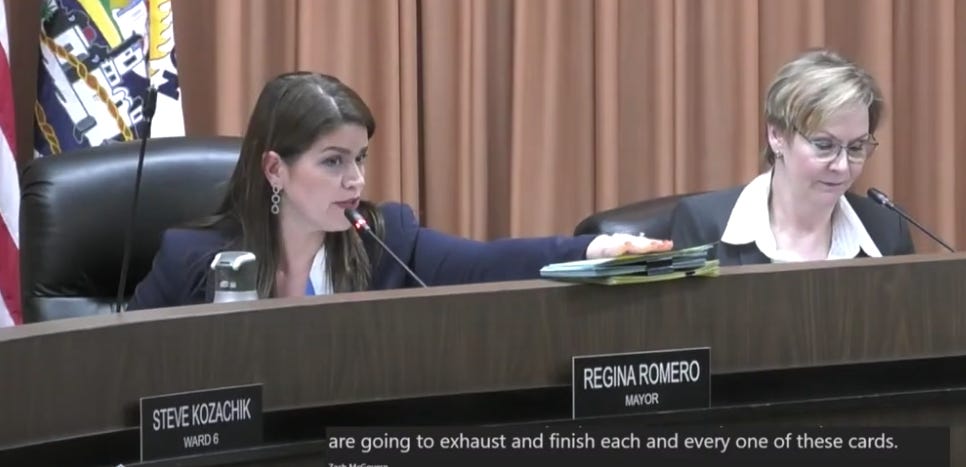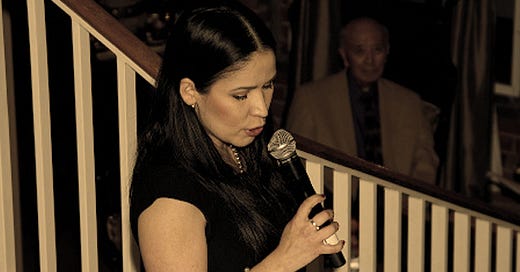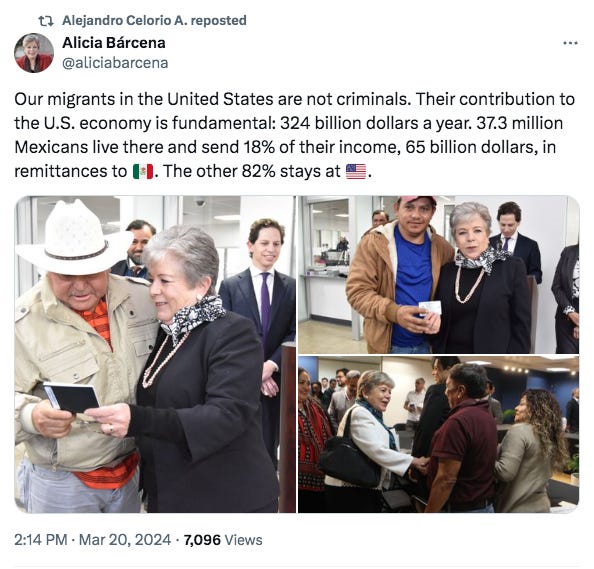The Daily Agenda: Activism is a family affair for nonprofit's new CEO
The Latino-led, Latino-serving nonprofit Amistades is under new leadership ... But its new CEO is far from a stranger ... Tearful goodbye for local high school.
As a child growing up in San Antonio, Claudia Jasso walked alongside her mother every year in the Paseo de Marzo, an annual parade honoring Mexican-American citizens.
She vividly remembers the brightly decorated floats and vans and the people along the route, dancing and cheering with the music.
“It was just one of those things we would do,” Jasso said. “During the Chicano movement, my sister and I were those kids going everywhere with their parents. I had the privilege of being in these community spaces.”
Decades later, Jasso is bringing everything she learned from her activist parents into her role as the new CEO of the Latino-led and Latino-serving nonprofit Amistades, Inc., which works to develop culturally responsive services and advocate for social justice throughout Southern Arizona.
And while it’s a new role, it’s not all unfamiliar. Jasso is following in the footsteps of Amistades’ founder and former CEO and her father, Ricardo Jasso.
After moving to Tucson from San Antonio, Ricardo Jasso founded Amistades in 2006 as a way to engage with the Latino community and find a new way to harness its cultural strengths. The organization has grown over the years, with Claudia Jasso working behind the scenes the entire time.
Today, Amistades advocates for race equity, social justice and community empowerment and creates networks around these and other issues. It has an annual operating budget of $2 million and offices in Tucson and Douglas, which allows them to serve the Southern Arizona and border region.
Jasso said her transition to CEO represents both a leadership transition, as well as a transition in the way Amistades is reaching the community.
“We’re in a period of growth right now that is challenging, because it means more work and more responsibility, but it’s really gratifying,” she said. “We’ll be able to reach more people, expand into other regions and other counties in Southern Arizona.”
In addition to its offices in Tucson and Douglas, Amistades works with community partners in Santa Cruz and Pinal counties to help deliver programs and services, taking into account the differing voices in the community.
“One of the elements of our success has been respectfully and intentionally stepping into community spaces in partnership with (other groups) and letting them guide the process,” Jasso said. “We bring the resources so they can get to the place where they’d like to be.”
When Amistades started almost 20 years ago, its programming was primarily focused on substance use prevention, but its efforts have expanded to include community-centered healing, policy and advocacy work, intergenerational education, research collaboratives and more.
Some of their immediate priorities include working to advance health equity, civic participation and environmental justice for Latino community members and seeking out federal funding to address these areas.
“We want our work in the community to be sustainable. That’s a hard thing to do, but still it’s something we are doing and will continue to do in the decades to come,” Jasso said. “And this work does transform communities. We respect those communities for the abilities they already have, we just want to help them achieve their goals and find solutions.”
In the area of environmental justice, Amistades is working with the City of Tucson, Arizona Center for Empowerment and community groups Chispa Arizona and Living United for Change in Arizona on a project to bring shade to the 85706 zip code. The three-year Justicia Juntos (Justice Together) initiative is funded by the Environmental Protection Agency and aims to create heat resiliency in Latino-dominant communities in Tucson that are disproportionately affected by the impacts of climate change.
The money will be used in part to develop a coalition of youth advocates to recruit additional climate action advocates in their neighborhoods. The grant will also help build two Climate Resilience Hubs to provide safe spaces for residents to cool down, build connections and access resources.
“I think we can get further faster when we all work together, across ethnicities and across races,” Jasso said. “When we work together, things are possible that are not when we’re working in a silo.”
And working with others is necessary when trying to create system-focused strategies to change conditions that perpetuate inequities, which is one of Amistades’ goals.
The challenges are big and the need is greater than ever, but Jasso knows change is possible. She’s seen communities learn to grow, adapt and thrive during her time with Amistades and beyond.
“’I’m the daughter of community activists, so I’ve seen this happen my whole life. And it doesn’t feel like work. I just believe in every fiber of my being in what we’re doing,” she said. “It’s not the Paseo de Marzo and I’m not 10 years old anymore, but this is just a different era and another part of the same story.
Vote here: The outcome of Tuesday’s election may have been a foregone conclusion, but it still brought out colorful characters who wanted to do their civic duty. Arizona Luminaria reporters Kiara Adams and Noor Haghighi hung out at polling places to hear what voters had to say. Some people forgot to mail their ballots. Some weren’t happy with their choices. And some were encouraging Democrats to vote for Marianne Williamson as a protest of President Biden’s handling of the Hamas-Isreal conflict, similar to the “uncommitted” votes in other states, which isn’t an option on Arizona ballots.
End of an era: In an emotional moment at the Pima County Board of Supervisors meeting on Tuesday, the supervisors surrendered the charter of Pima Vocational High School, marking the end of 24 years of educating students, KOLD’s Bud Foster reports. When it opened, charter schools were fairly unique. But over the years, more charter schools opened, the Pima Joint Technical Education District was founded, and enrollment dropped at the high school. School officials called out what they saw as neglect from the county and students took turns telling the supervisors why they loved their school.
“My time at the school, compared to all the others, has been second to none, the community there, the support there,” said senior Caleb Barkett. “I actually enjoyed showing up to school.”

Reason for the trip: When state Rep. Alma Hernandez, a Tucson Democrat, took a group of legislators to Israel recently, she faced criticism on a number of fronts, including what role Arizona legislators would have with regard to Israel. She spoke with KJZZ’s Lauren Gilger about a number of issues, including why she thought it was important for legislators to make the trip. She cited university groups in Arizona “calling for the death of Zionists” as well as cities passing ceasefire resolutions.
“Well, you know, we, we constantly deal with situations, not only on the state level, but also on the local municipality levels. We're seeing city councils right now trying to pass resolutions, school boards, you name it,” Hernandez said.
Border politics: Democratic local, state, and federal officials held a press conference in Nogales to call on Congress to pass a border bill that died after former President Trump said it was “horrendous,” the Sentinel’s Paul Ingram reports. Arizona Attorney General Kris Mayes pointed out the scanning equipment needed to detect fentanyl at ports of entry can’t be installed because the funding to install it was in the stymied border bill.
Thomure tapped: The Tucson City Council named Tim Thomure as the next city manager, the Tucson Sentinel’s Dylan Smith reports. He’s the deputy city manager right now, and formerly the head of Tucson Water. He’ll take over when City Manager Mike Ortega leaves in June. The council voted 6-0, with Councilmember Lane Santa Cruz expressing “frustration” that there wasn’t more discussion. Instead, the council went with the person Ortega picked to succeed him.
Looking for a replacement: The city council also set in motion the process to replace Councilman Steve Kozachik, who’s leaving to take a job with Pima County, the Arizona Daily Star’s Charles Borla reports. Kozachik steps down March 31 and the council will start accepting applications from April 1 to April 15. Applicants must be Tucson residents for three years; Ward 6 residents for one year; submit a letter of interest and resume. And they’ll have to say whether they plan to run for the seat next year. The council will decide at the end of April.
$166,700: The amount of money Amistades, Inc. received from the Environmental Protection Agency’s Environmental Justice Collaborative Problem Solving Program to help launch its Justicia Juntos initiative.







